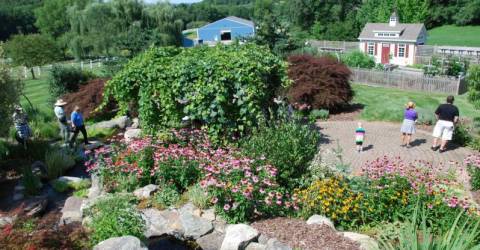Local backyard food farmers will open their garden gates for Dirt magazine's Kitchen Garden Tour on Sunday, July 28th.
Now in its 10th year, the tour will visit more than a dozen gardens, including popular gardens from past years.
Tickets can be purchased online at kitchengardentours.com.
Armed with a map and a description of each garden, ticket holders will depart for a self-guided tour at 10am, hopping from one local vegetable patch to the next.
At each plot, they explore the gardens and meet the owners, who are master gardeners, to learn new tips.
Selected ticket holders will interact with Meadow Blues gardeners from 5-7pm, and at the end of the day everyone will vote for their favourite garden, with the winner announced at the event.
Fig tree and flowers
Dawn Mele's garden in Vernon tied for first place in 2022.
When she was growing up, her mother always had a big garden in the backyard of their house.
“I grew up always picking things or growing things,” she said.
Today, Mele and her husband live in the same house she grew up in, which they purchased 25 years ago, and although the house looks a little different now, the nutrient-rich soil remains.
Mele's current garden is a project he started after the pandemic hit, initially growing only vegetables but soon expanding to growing cut flowers as well.
She has grown her extensive garden from seed and is constantly introducing new plants and projects.
Her favorite time-saving device in the garden is drip irrigation, which is easy, convenient and saves water.
Mele's garden is made up mostly of raised flower beds built by her carpenter husband, but it also has citrus trees, olive trees, an orchid collection, cacti and a greenhouse for special projects.
“You never plant the same thing twice,” she says, “and you learn something new every day. It helps you develop perseverance.”
The garden is one of her favorite places, and she enjoys hosting like-minded gardeners there to console each other over gardening failures and share the joy of “small victories.”
“Food Forest”
Kitchen Garden Tour alumni April and Rocco Percivali of Lafayette are excited to be able to show off their garden again this year.
April grew up in her mother's garden and while she wasn't particularly interested in vegetable patching as a child, as she grew older she “remembered how delicious vegetables were” and decided to start a garden of her own in 1999.
“Originally we just dug up some soil and planted tomatoes,” she says.
The tomatoes grew well that first year, and April went to bed excited to harvest them the next morning, only to wake up to find that the T-Rex had eaten them all.
The following season, the Persivalis added fencing to their property, and now their home has what April calls a “permanent vegetable garden.” She grows peas, eggplant, garlic, asparagus, zucchini, sweet potatoes, and tomato varieties, but her favorite is Sungold.
Rocco has his own garden “to grow all the things I can't grow myself,” April said, and he continues to experiment by adding new plants to his garden.
In Rocco's “food forest,” nut trees, figs, honeyberries and other plants are just beginning to bear fruit.
The Persivalis are vegan and eat or can most of what comes from their garden. They have three children and six grandchildren, who love helping with the surplus berries.
In addition to the experimental plants, the Persivalis family added some new amendments to the soil. The addition of calcium and natural fertilizers has helped the garden thrive this season.
“You have to nurture the soil,” April says. She's also experimented with mixing raised beds to grow different vegetables together, so far with success. These experiments are “an opportunity to reduce labor and increase yields.”
Farmer-led gardening
Fourth-generation farmer Chris Pawelski plans to open his farm in Goshen, New York, to the public this year.
Pawelski, who lives in the historic Black Dirt area, is “planning a lot of quirky things that you won't find anywhere else.”
“I was a traditional onion farmer until COVID,” he explained. The pandemic disrupted traditional agricultural markets, and in response, he and his wife, Eve, pivoted from growing onions to growing niche crops like purple beans and white peppers.
The Pawelskis run their farm independently, giving away portions of the land to former farm workers so they can grow their own food.
“I have the space, so I'm not going to charge,” he said. “If they want something, they can take it home.”
A lifelong farmer, he has plenty of unique tips and tricks for keeping pests at bay, like spraying his crops with purple Kool-Aid to keep birds and small animals away. His cats, Oreo and Squatty, also help keep intruders at bay.


